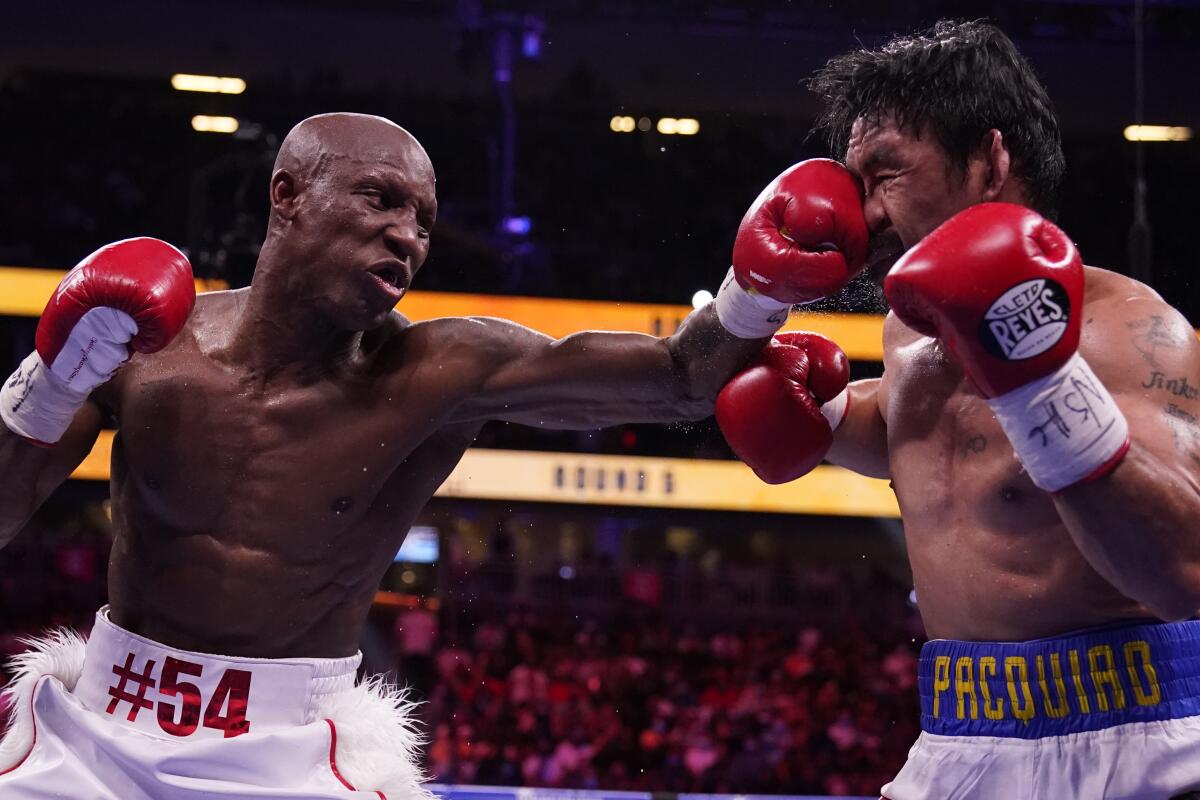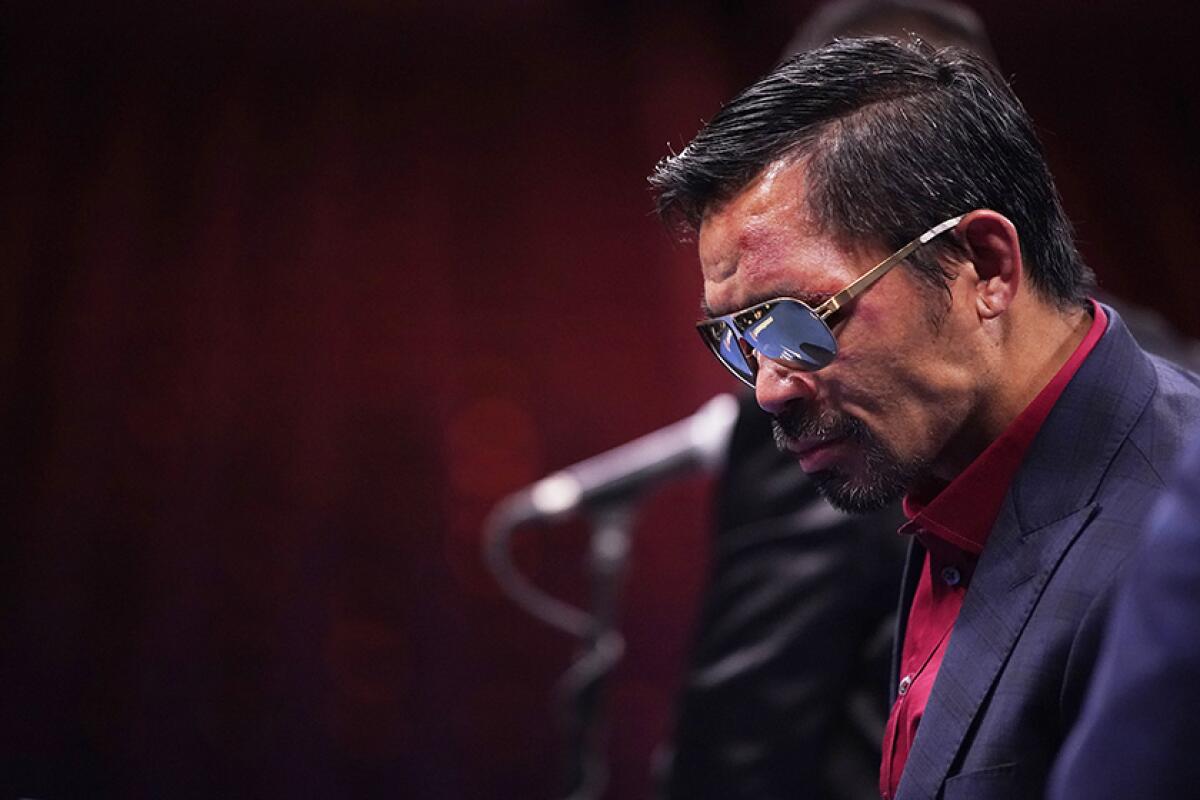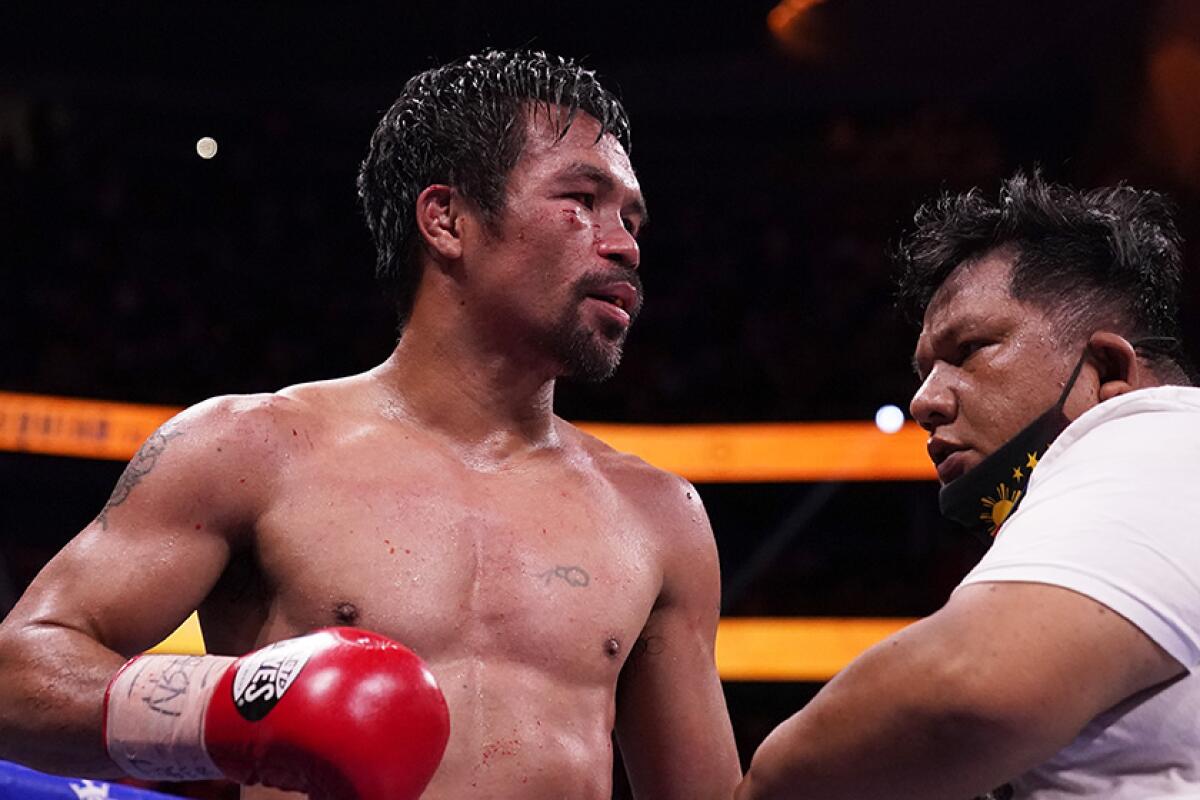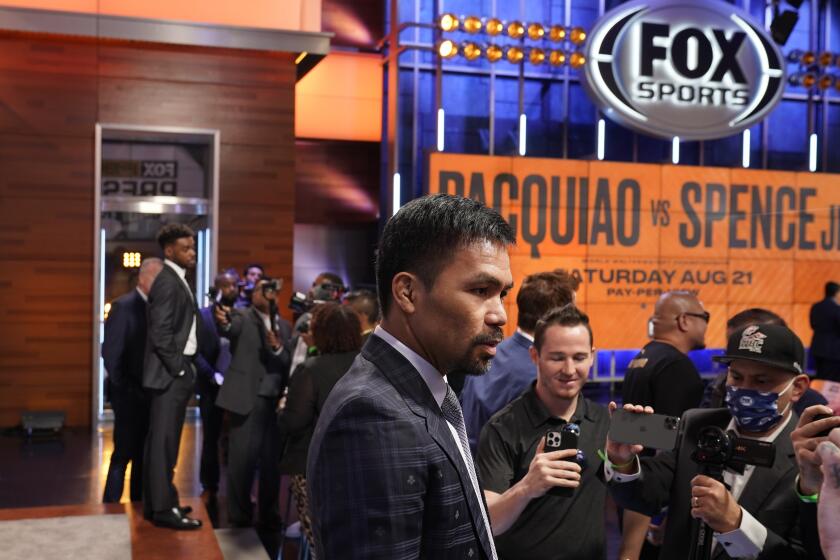Column: Manny Pacquiao was hit by reality after bruising loss, and he handled it with dignity

- Share via
LAS VEGAS — An assembly line of mediocre opponents kept alive the fantasy in recent years, but reality became inescapable for Manny Pacquiao on Saturday night.
He was old.
What was made obvious in a unanimous-decision loss to Yordenis Ugas crushed the 42-year-old Pacquiao, his heartbreak betrayed by the shakiness of his voice. The majority of the 17,438 fans in T-Mobile Arena shared his disappointment.
That’s when something remarkable happened.
Pacquiao forced his trademark smile. He complimented his opponent. He thanked the crowd.
Manny Pacquiao will soon fight in his 82nd pro bout. Many think it is to boost his popularity before the upcoming Philippines presidential election.
“I really appreciate your effort to come here despite this pandemic,” he said. “I’m sorry that we lost tonight, but I did my best.”
His demeanor transformed what was essentially his professional funeral into a celebration, the packed house breaking out in a chant of his name. Like he had done so many times before, Pacquiao made the coldest of environments feel warm.
There are a number of fighters in history who were better than Pacquiao, some of them smarter, some of them more technically sound. Outside of maybe Muhammad Ali, however, none of them radiated as much joy.
In the immediate aftermath of his loss, Pacquiao said he didn’t know whether he would fight again. But if he retires, this sense of intimacy that he creates will be missed in boxing — actually, in all of sports.
His electrifying fighting style alone wasn’t responsible for his widespread popularity. If not for his nature, he almost certainly wouldn’t have a seat in the Philippines senate.
He is expected to run for his country’s presidency next year. He sounded like a head of state in his post-fight news conference.
“God is love and therefore we must love each other and help each other, show it not only [with] words but [with] action,” Pacquiao said.
He went on to thank the reporters who covered him, the promoters who championed him and the fans who cheered him on.

“Thank you to all of you,” he said. “Thank you boxing.”
His grace was extraordinary considering what happened over his 12 rounds against Ugas.
Late in the third round, Pacquiao ate a punch while against the ropes and leaped forward to return fire.
How many times had this very sequence played out over his previous 71 fights?
He did it against Erik Morales and Juan Manuel Marquez, against Oscar De La Hoya and Miguel Cotto.
Only this time, when Pacquiao unleashed a combination, his opponent was nowhere near.
The accidental shadowboxing exhibition revealed a problematic truth: His legs were gone.
Pacquiao had become the boxing equivalent of a jump shooter who couldn’t get to his spot. He didn’t have the foot speed to slip inside against the taller Ugas. His lack of lateral movement kept him from maneuvering around Ugas’ high guard.
“My two legs were cramping,” Pacquiao said. “That’s why I couldn’t move around.”
Asked if the cramping was a symptom of age or other factors, Pacquiao mentioned the possibility of overtraining.
“But,” he added, “we’re not young anymore.”

From his southpaw stance, Pacquiao had some success in the early rounds countering over Ugas’ left jab. But once Ugas made a concerted effort to quickly return his lead hand to a defensive position after flicking a punch, Pacquiao was forced to start lunging forward in desperation, opening him up to power shots.
Pacquiao’s longtime trainer Freddie Roach has always said that when a fighter becomes old, the first thing to go are his legs.
“I’m a little bit worried about it, yes,” Roach said. “I hate to see that day when he retires, but this could be it.”
On the bright side, this could have been worse. While Ugas clearly won, he fought too conservatively to inflict serious damage on Pacquiao.
Fighting the way he did on Saturday night, Pacquiao would have almost certainly taken a savage beating had he taken on his originally scheduled opponent, undefeated welterweight champion Errol Spence. The hard-hitting Spence was discovered to have an eye injury in a pre-fight screening.
The fighter is almost never the one who decides when he’s finished. His opponents do, which is why most great boxing careers finish with the fighter looking like Willie Mays on the New York Mets — if Mays had been jumped and mugged on the 7 Train of his way out of Flushing.
Pacquiao couldn’t escape this fate either. Nonetheless, if that was really his last fight, he will be leaving the sport with his dignity intact, his continued consideration for others in a time of despair a testament to his character.
More to Read
Go beyond the scoreboard
Get the latest on L.A.'s teams in the daily Sports Report newsletter.
You may occasionally receive promotional content from the Los Angeles Times.












